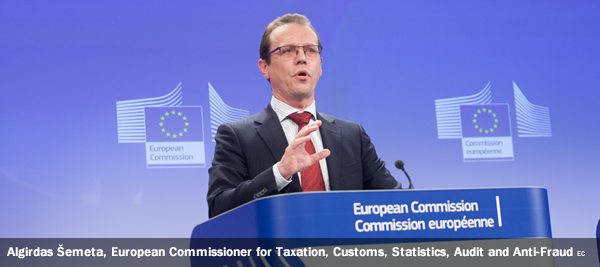A new standard VAT return, which can cut costs for EU businesses by up to €15 billion a year, has been proposed by the Commission today. The aim of this initiative is to slash red-tape for businesses, ease tax compliance and make tax administrations across the Union more efficient.
Algirdas Šemeta, Commissioner for Taxation, said: “The standard VAT return presents a win-win situation. Businesses will enjoy simpler procedures, reduced costs and less red tape. Governments will have a new tool to facilitate VAT compliance, which should increase the revenues they collect. Today’s proposal therefore supports both our commitment to a business-friendly Single Market and our drive to improve tax compliance in the EU.”
Šemeta said the proposal reflects the Commission’s approach to smart regulation and is one of the initiatives set out in the recent REFIT to simplify rules and reduce administrative burdens for businesses (IP/13/891). Today’s proposal foresees a uniform set of requirements for businesses when filing their VAT returns, regardless of the Member State in which they do it. The standard VAT return – which will replace national VAT returns – will ensure that businesses are asked for the same basic information, within the same deadlines, across the EU. Given that simpler procedures are easier to comply with and easier to enforce, today’s proposal should also help to improve VAT compliance and increase public revenues.
Every year, 150 million VAT returns are submitted by EU taxpayers to national tax administrations. Currently, the information requested, the format of national forms and the reporting deadlines vary considerably from one Member State to the next. This makes VAT returns for cross-border businesses a complex, costly and cumbersome procedure. Businesses operating in more than one Member State have also complained that it is difficult to remain VAT compliant, due to the intricacy of the process.
The standard VAT return proposed today simplifies the information that businesses will have to provide to tax authorities. The declaration will have only 5 compulsory boxes for taxpayers to fill in. Member States are given leeway to request a number of additional standardised elements, up to a maximum of 26 information boxes. This is a vast improvement on the current situation, whereby some Member States require up to 100 information boxes to be completed.
Businesses will file the standard VAT return on a monthly basis, while micro-enterprises will only be obliged to do it on a quarterly basis. The obligation to submit a recapitulative yearly VAT return, which some Member States currently demand, would be abolished. The proposal also encourages electronic filing, as the standard VAT return will be allowed to be submitted electronically throughout the Union. This major simplification of the process for VAT returns supports the Commission’s wider commitments to reducing administrative burdens and obstacles to trade within the Single Market.
It is seen as an important contribution to creating a more efficient and more fraud-proof VAT system, as set out in the Commission’s Strategy for VAT reform (see IP/11/1508). VAT accounts for around 21% of Member States revenues, and yet around €193 billion went uncollected in 2011 (see IP/13/844). By creating an easier system for both taxpayers and administrations to work with, the standard VAT return can improve tax compliance and reduce the VAT Gap. As such, today’s proposal could make an important contribution to fiscal consolidation across the EU by increasing income to the public purse.
In December 2011, the European Commission adopted a Communication on the future of VAT (IP/11/1508). This Communication sets out the fundamental characteristics that must underlie the new VAT regime – notably to make it simpler, more efficient and more robust against fraud, and better tailored to the Single Market.
The idea of a standard VAT declaration has been promoted by the High Level Group on Administrative Burdens. A public consultation confirmed major interest and support from businesses for such an initiative.
The Communication on Smart regulation (IP/10/1296) also highlighted the VAT Directive, and VAT declaration in particular, as the second most burdensome piece of EU legislation. Today’s proposal seeks to redress that.
